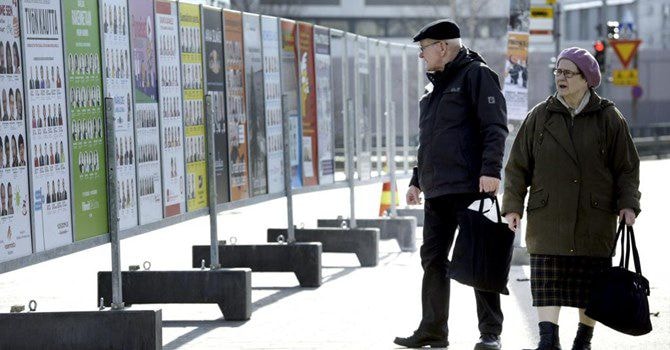Finland's smart policy, the "art" of living next to Russia
As a small country, Finland has a clear, smart choice in foreign affairs: not to flatter a giant, aggressive, rearming Russia, and at the same time not to advocate joining the North Atlantic Alliance - NATO.
 |
| Finland ahead of parliamentary elections on April 19. Pictured, election advertisements on a street in Helsinki, April 10, 2015. REUTERS/Heikki Saukkomaa/Lehtikuva |
On April 19, 2015, Finland held parliamentary elections. As a small country, Finland made a clear and smart choice in foreign affairs: not to flatter a giant, aggressive, rearming Russia, and at the same time not to advocate joining the North Atlantic Alliance - NATO, RFI wrote.
Last year, Russia’s annexation of Crimea and increased military activity in the Baltic Sea sparked much debate in Finland. Some in the political leadership spoke of the need to join NATO, but the topic was rarely mentioned during the legislative election campaign.
What is surprising is the absence of security issues in the debate, according to Juhana Aunesluoma, professor of political history at the University of Helsinki, quoted by AFP. "It is clear that people are concerned, but they seem to support the general consensus within the current government, which is to continue maintaining the European Union's policy of strengthening cooperation with NATO within the current framework."
For Finland, a country of 5.5 million people that shares a 1,340-km border in the east with Russia, maintaining its non-aligned tradition is seen as the best means of maintaining relatively good relations with Moscow.
The events of the "Winter War" of 1939-1940 are still deeply ingrained in the memory of the Finnish people. After the failure of negotiations to establish a buffer zone to protect Leningrad (now Saint Petersburg), the Soviet army invaded Finland, which was under Moscow's sphere of influence. The war lasted more than 100 days.
The Moscow Agreement signed in January 1940 eliminated French and British plans to send troops to rescue Finland, turning the country into a battlefield.
From then on and throughout the Cold War, Finland maintained a moderate attitude towards the Soviet Union, doing business with both sides, East and West.
After the collapse of the Soviet Union, Finland joined the European Union in 1995, and increased cooperation with NATO, within the Partnership for Peace framework, supporting the bloc's intervention in Afghanistan.
According to analysts, the Helsinki government favors a common European defense policy instead of relying entirely on NATO.
Although Finland does not appear to be concerned about the Russian military threat, it remains vigilant. General Jarmo Lindberg, commander of the Finnish army, said that although Moscow has done nothing to threaten, the number of Russian aircraft violating Finnish airspace has increased. Therefore, the Finnish army needs to review its preparations and readiness to respond.
During a meeting between five countries, Finland, Sweden, Denmark, Norway and Ireland, on April 10, the Finnish Defense Minister stated that Russia is "the biggest challenge to security in Europe". In the statement, the Defense Ministers of the five countries emphasized: "We must be ready to deal with crises or incidents when they recur". The defense leaders of the five countries agreed to strengthen military cooperation, conduct joint exercises and training, and exchange intelligence information.
For his part, the Finnish Prime Minister called on people to remain calm and not to panic. But according to a poll published in the Helsinki Sanomat newspaper last March, 61% of respondents said that "Russia is currently the biggest threat to Finland".
However, the number of people in favor of joining NATO is only 27%, the highest rate since 2002, and 57% are against the idea.
The foreign affairs sector is also under the jurisdiction of Finnish President Sauli Niinisto, who advocates maintaining good dialogue with his Russian counterpart Vladimir Putin.
"It seems that there will be no major changes. The current (foreign) policy has been agreed between the major political parties and the President," expert Aunesluoma stressed.
According to BizLIVE






